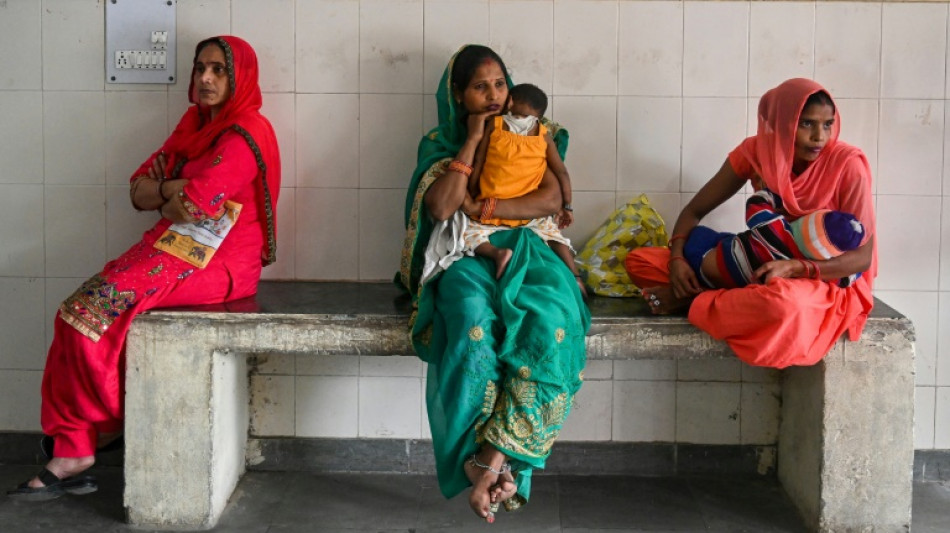
-
 'Things are different' Djokovic says after another early exit at Indian Wells
'Things are different' Djokovic says after another early exit at Indian Wells
-
Colombian guerillas release hostage security forces

-
 France lose Dupont but Six Nations title on the cards after thrashing Ireland
France lose Dupont but Six Nations title on the cards after thrashing Ireland
-
Phone bans sweep US schools despite skepticism

-
 Did Ukraine have to become a partisan US issue?
Did Ukraine have to become a partisan US issue?
-
Djokovic crashes out of Indian Wells opener

-
 Britain's King Charles calls for unity in 'uncertain times'
Britain's King Charles calls for unity in 'uncertain times'
-
Morikawa seizes lead at Arnold Palmer after birdie rally

-
 Alcaraz, Keys breeze into Indian Wells third round
Alcaraz, Keys breeze into Indian Wells third round
-
Record-setting Skotheim claims European indoor heptathlon title

-
 Inter survive Monza scare to extend Serie A lead
Inter survive Monza scare to extend Serie A lead
-
Argentina port city 'destroyed' by massive rainstorm, 13 dead

-
 Townsend relishing 'toughest fixture' in France after Scotland's Six Nations win over Wales
Townsend relishing 'toughest fixture' in France after Scotland's Six Nations win over Wales
-
Colombian guerillas release hostage security forces: AFP

-
 Some 200 detained after Istanbul Women's Day march: organisers
Some 200 detained after Istanbul Women's Day march: organisers
-
Draper sends Brazilian sensation Fonseca packing at Indian Wells

-
 Man with Palestinian flag scales London's Big Ben clock tower
Man with Palestinian flag scales London's Big Ben clock tower
-
Protesters rally on International Women's Day, fearing far right

-
 Australian Open champion Keys cruises into Indian Wells 3rd round
Australian Open champion Keys cruises into Indian Wells 3rd round
-
Barca Liga match postponed after club doctor dies

-
 Alldritt revels in 'historic' French performance to thrash Irish
Alldritt revels in 'historic' French performance to thrash Irish
-
Watkins haunts Brentford to revive Aston Villa's top-four hopes

-
 Pulisic double rescues AC Milan at lowly Lecce
Pulisic double rescues AC Milan at lowly Lecce
-
Mirrors, marble and mud: Desert X returns to California

-
 'Grieving': US federal workers thrown into uncertain job market
'Grieving': US federal workers thrown into uncertain job market
-
Slot blast fuelled Liverpool's comeback against Southampton

-
 Russell back in the groove as Scotland see off Wales in Six Nations
Russell back in the groove as Scotland see off Wales in Six Nations
-
Remains of murdered Indigenous woman found at Canada landfill

-
 French throng streets for International Women's Day rallies
French throng streets for International Women's Day rallies
-
Security forces taken hostage by Colombian guerillas released: AFP

-
 Pope responding well to pneumonia treatment, Vatican says
Pope responding well to pneumonia treatment, Vatican says
-
France coach Galthie 'angry' at Dupont knee injury

-
 The French were clinical, we were not, says Irish coach Easterby
The French were clinical, we were not, says Irish coach Easterby
-
Sleeping man is struck by train in Peru but survives

-
 Dembele hits double as PSG win ahead of Liverpool return
Dembele hits double as PSG win ahead of Liverpool return
-
Bosnia top envoy backs court ruling against separatist laws

-
 Bayern get away with shock loss as Leverkusen fall to defeat
Bayern get away with shock loss as Leverkusen fall to defeat
-
'We have to rebuild a city,' Argentine official says after storm kills 10

-
 Guardiola urges troubled Man City to fight for Champions League place
Guardiola urges troubled Man City to fight for Champions League place
-
Salah fires Liverpool 16 points clear, Forest beat Man City

-
 Liverpool fight back to go 16 points clear as title moves closer
Liverpool fight back to go 16 points clear as title moves closer
-
Hermes celebrates felt at Paris Fashion Week

-
 Bayern unpunished for shock loss as Leverkusen fall to defeat
Bayern unpunished for shock loss as Leverkusen fall to defeat
-
Majestic France destroy Irish Six Nations Grand Slam dreams

-
 Santner wants New Zealand to keep 'open mind' for Champions Trophy final
Santner wants New Zealand to keep 'open mind' for Champions Trophy final
-
Pogacar remounts after fall and charges to Strade Bianche win

-
 Negri wants Italy to 'make things right' against England in Six Nations
Negri wants Italy to 'make things right' against England in Six Nations
-
Attack on Iran nuclear plant would leave Gulf without water, Qatar PM warns

-
 Mitchell backs Dingwall to be England rugby's answer to Rodri
Mitchell backs Dingwall to be England rugby's answer to Rodri
-
Unfinished business for India in Champions Trophy final, says Gill


Family planning in India: A woman's dangerous burden
Occasional screams sounded from the operating theatre in a rural Indian clinic as a heavily sedated woman named Kajal waited to have her tubes tied, long the country's preferred family planning method.
"The anaesthesia must not have kicked in," one healthcare worker said outside the facility in the northern village of Bhoodbaral, where a line of women in colourful headscarves waited to undergo the invasive, and sometimes risky, 50-minute procedure.
India is set to become the world's most populous nation by mid-year, according to UN figures published Wednesday, overtaking China, where the population shrank last year for the first time since 1960.
The Indian government launched a nationwide family planning programme in 1952 -- long before societies around the world had even started to destigmatise birth control.
But in the decades that followed, as the pill and condoms became the go-to contraceptive methods for millions elsewhere, men in India were subjected in the 1970s to a brutal programme of forced sterilisation.
Since then the focus has shifted to women in India, with tubal ligation the preferred method of birth control.
There is a non-invasive vasectomy available for men but women like Kajal are often convinced by government healthcare workers to undergo the procedure, often with cash incentives of around $25.
Kajal, 25, said she and her husband Deepak decided she would undergo the operation since they can barely make ends meet with their three children.
"I thought it would make me weak," Deepak, a factory worker, said when asked why he chose not to have a vasectomy.
- Myths around virility -
Poonam Muttreja from Population Foundation of India said Deepak's fears about how a vasectomy -- a reversible, 10-minute procedure -- would affect him were common in what is still a "very patriarchal society".
"The most popular myth that exists among both men and women is that a man will lose his virility," Muttreja told AFP.
"This is a myth which has no science... but it is a belief. The belief is the reality for people," she said.
The health centre in Bhoodbaral sterilised more than 180 women compared with just six men from April 2022 to March this year.
"People have a misconception that no-scalpel vasectomy for males leads to impotence... This has become a taboo," said Dr Ashish Garg, the facility's medical superintendent.
- Dangerous -
Makeshift sterilisation clinics that perform tubal ligations on women are common in India, particularly in its vast rural belts where two-thirds of the population live, and so are botched surgeries.
Four women died and nine others were hospitalised last year after getting their tubes tied in the southern state of Telangana.
In 2014, at least 11 women died after sterilisations at a makeshift clinic in the central state of Chhattisgarh.
Muttreja said the government needs to do more to promote contraception.
She also said the solution to getting more men to have the operation was better education.
"It's a magical pill... Investing in health and education would have reduced the economic cost to the family and also to the nation," she said.
But Harbir Singh, a 64-year-old local resident, still believes that vasectomies rob men of their "strength" needed to work and put food on the table.
"The man has to go out and earn... The women make food and stay at home," he said.
"What will happen without the man?"
D.Moore--AMWN


